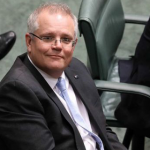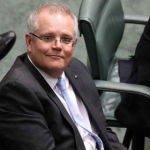Australia Gives the Nod to Israeli Expansion in Occupied Palestine

Israeli prime minister Benjamin Netanyahu indicated on 30 June that his country’s newly established coalition government will be pressing ahead with plans to annex up to 30 percent of the occupied West Bank, despite missing the original 1 July commencement date.
Netanyahu said he’s continuing to seek US approval for the sizable landgrab. And while the Trump administration has stalled on providing its support, it must be remembered that its own January issued “peace plan” – dubbed the deal of the century – aligns with the Israeli expansionist proposal.
The annexation plan, along with all Israeli West Bank settlements, are in violation of the Fourth Geneva Convention, which outlines that an occupying power “shall not deport or transfer parts of its own civilian population into the territory it occupies”.
And accordingly, Netanyahu’s proposal has been internationally condemned. A statement issued by the UN Human Rights Council denounced the annexation plan as “it incites wars, economic devastation, political instability, systematic human rights abuses and widespread human suffering”.
However, in stark contrast, the Morrison government has been at pains to support the Israeli plan. And this is readily apparent despite foreign minister Marise Payne having reluctantly issued a rather weak condemnation on the day the annexing program was supposed to commence.
Escalating dispossession
Australia Palestine Advocacy Network (APAN) president Bishop George Browning said that “at one level”, the commencement of Netanyahu’s plan would simply be a continuation of Israel’s practice of “annexing Palestinian land since the signing of the Oslo Agreement.”
But “on the other hand”, if the new annexation plan does go ahead “it will be devastating”, as “it formalises and legitimates past illegal actions and makes a two-state solution impossible”, he told Sydney Criminal Lawyers.
The two Oslo Accords were signed in the mid-1990s, creating interim governing arrangements, including the establishment of the Palestinian Authority (PA).
These accords were supposed to last five years, as the parties worked towards a two-state solution, although the arrangements continue on to this day.
The second Oslo Accord haphazardly split the West Bank up into three different zones. Areas A and B are under the internal control of the Palestinian Authority, but external security is still in the hands of Israel.
While Area C, which constitutes 60 percent of the West Bank, is under complete Israeli control.
Bishop Browning warned that if Israel embarks on its annexation plan, it will rob the “Palestinians of their most productive food producing land”. And in terms of further negotiations, the “Palestinian leadership has already said it will no longer talk to or cooperate with Israel or the US”.
And the bishop further explained that if Israel goes ahead then the Palestinians mean to abandon the PA, which means much of Palestine’s money that funnels in through Israel would be lost, while Israeli forces would assume total security control and water and electricity would be jeopardised.
Denying self-determination
Australian foreign minister Marise Payne issued a brief statement on 1 July, which urged “all parties to refrain from actions that diminish the prospects for a negotiated two-state solution, including acts of violence and terrorism including rocket attacks on civilians, and land appropriations, demolitions, and settlement activity.”
Although, other foreign policy actions recently taken by our nation on the international stage seem to greenlight acts such as “land appropriations, demolitions, and settlement activity”, especially when it’s being carried out by Israel.
On 22 June, the UN Human Rights Council adopted 13 resolutions. And Australia was conspicuous in being one of only two nations that voted against three of the resolutions that dealt specifically with the rights of Palestinian people.
The other nation was US associate state the Marshall Islands.
The first resolution Australia opposed called on states to ensure they do not take actions that recognise, aid or assist in the expansion of illegal Israeli settlements, or the construction of the wall, in the Occupied Palestinian Territory.
The second resolution that Australia simply couldn’t agree to demanded that Israel withdraw from all the Palestinian territory that it’s occupied since 1967, “so as to enable the Palestinian people to exercise its universally recognised right to self-determination”.
This resolution also sought to ensure that when Israeli authorities arrest, detain or put on trial any Palestinian children it should be done “in line with the Convention on the Rights of the Child, including by refraining from holding criminal proceedings against them in military courts”.
And the third resolution that our country voted against was one that confirmed the right of Palestinians to “permanent sovereignty over their natural wealth and resources”, as well as acknowledging their right to self-determination.
Inexplicable, to say the least
Bishop Browning said that Australia’s voting against these resolutions is “extraordinary”, especially as “Morrison and his government constantly rail against foreign interference”.
“There can be no other reason for this inexplicable and immoral position other than pressure from Israel-based Zionist lobbying,” he added. “Why Australia should be such fertile soil for this lobbying, and why it is supposedly within Australia’s best interest to do so, I cannot explain.”
And as the bishop is well aware, this is not the first time that Australia has voted against positions that are not in the best interests of the Palestinian people at the United Nations.
On 14 May 2018, Israeli forces killed 58 unarmed Palestinian protesters along the border with Gaza. And following the massacre the UN Human Rights Council held an emergency meeting to discuss the deteriorating situation in the region.
Twenty nine of the nations gathered voted in favour of establishing an independent investigation into the human rights violations in Gaza. Although, two nations voted against this: the United States and Australia.
The notes of the meeting revealed that while Australia had “expressed deep sadness and regret about the loss of life and injury”, it believed that “Israel had legitimate security concerns.”
Bishop Browning makes clear that “despite the fact that Australia always says it supports a two-state solution in reality it does not, because it will not hold Israel to account for those actions which undermine its possibility” .
And he added that while foreign minister Payne initally “resisted pressure to condemn the proposed annexation”, she eventually conceded to do so “in a lukewarm manner”, in which she felt “the need to first condemn rockets flying from Gaza”.







